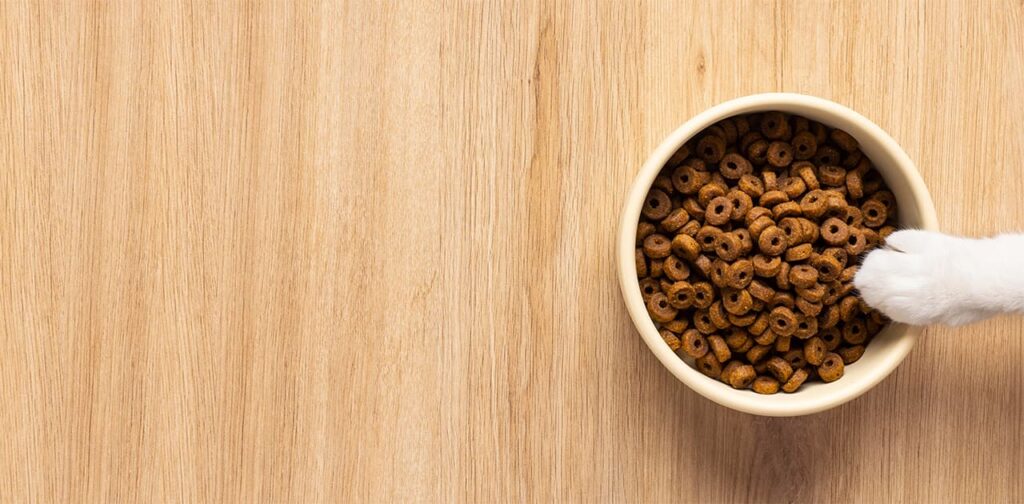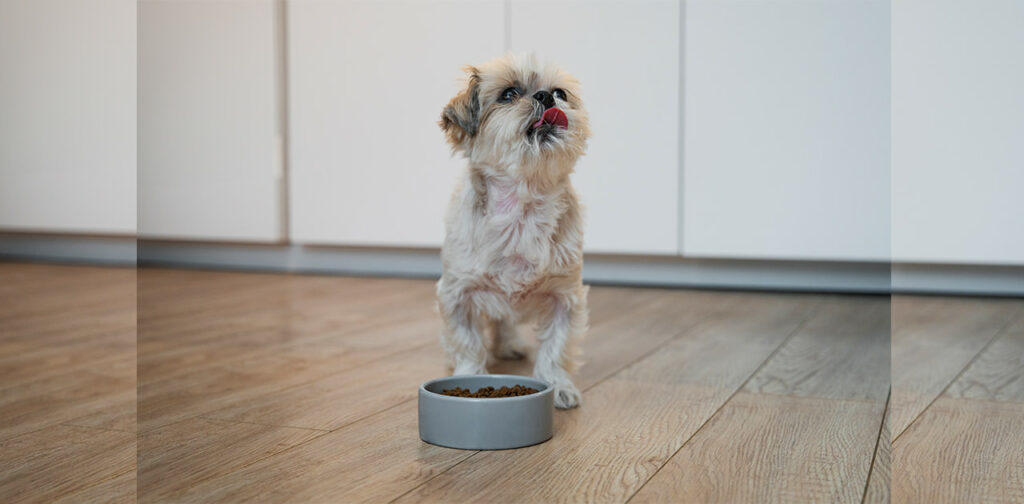There are a multitude of foods that claim to deliver the optimal level of health for your puppy. But as a puppy parent we can not take the risk of trusting all claims. To verify and justify the claims of these products, we must educate ourselves about the unique requirements of our little puppies.
Our puppies are very different in nature from the adult dogs. This makes their food and nutrient requirements different from adult dogs. If you feel overwhelmed with all the information out there, have a look at our quick guide for feeding growing puppies.

Guide To Feeding Growing Puppies
For the utmost wellbeing of your pup, as a veterinarian I have designed the ultimate guide for feeding growing puppies. This guide will help you to not only ensure your puppy’s optimal health and wellbeing but also enhance your bond through a happy feeding time.
Nutritional Needs For Growing Puppies
Puppies often need a higher level of nutrients due to their growing needs and higher energy needs. Your little puppy is at the phase of developing their brain, immune system, organs, bones and joints.
This creates a necessity for protein, fat, calcium, carbohydrates and DHA in their diet. Let’s discuss to what extent you should include each nutrient, so that you can keep an eye out for the required nutrients while buying the best puppy food for your furry friend.
- Protein: For developing muscle needs you should look for puppy foods with higher protein levels. Avoid feeding your puppy dog food as it does not contain the required amount of protein for your puppy’s growth and development.
- Fat: Puppies need a higher level of fat content in their dietary plans. As your puppy needs a lot of energy in their daily life they need absorption of fat soluble vitamins. This also aids in forming healthy skin and coat.
- Calcium and phosphorus: Your puppy should regularly intake controlled amounts of calcium and phosphorus. More or less than the required amount can cause skeletal issues. This aids in the development of bones, teeth and muscle. Also aids in nerve transmission, blood clotting, enzyme activity in the puppy’s body. The requirement may vary among different breeds of puppies.
- Carbohydrate: Your puppy needs higher carbohydrates in comparison to adult dogs due to their rapid growth phase. Besides contributing to puppy’s digestion and nutrient absorption, carbohydrate helps puppy’s energy, gastrointestinal health, brain function and cognitive development regulate blood sugar levels, and overall balanced nutrition.
- Vitamins and Minerals: You must include vitamin A, B, D, E in your pup’s diet to support their overall wait. Vitamin A supports your puppy’s vision, immune function, and skin health, vitamin D facilitates calcium absorption for healthy bone development, E acts as an antioxidant, supporting immune function and protecting cells from damage, and B-complex vitamins contribute to your puppy’s energy metabolism, nervous system function, and overall growth and development.
- DHA: For your pup’s brain development and cognitive function include DHA in their dietary plan. It is important to ensure to include DHA while feeding growing puppies.
- Water: We know our puppies are very energetic and curious in nature. We can find them jumping around all day long, chasing things, or running around you. To avoid dehydration make sure while feeding growing puppies, that they are always hydrated by giving them plenty of water.

Growing Puppies Feeding Schedule
Regardless of having a very small belly, your puppy does need higher energy. Your puppy surely can’t eat all the food that they need for this energy in one sitting.
Therefore it is important to give your puppy frequent meals throughout the day. Failing to maintain a proper feeding schedule may cause your puppy to feel overfed or left hungry. This can affect their health and development negatively.
Take a look at our simple and easy schedule to maintain your pup’s optimal feeding needs.
| Puppy Age | Frequency | Timing |
| 6-12 weeks old | Feed 4 meals a day. | Morning, noon, late afternoon, and evening. |
| 3-6 months old | Feed 3 meals a day. | Morning, afternoon, and evening. |
| 6-12 months old | Feed 2 meals a day. | Morning and evening. |
| 12 months and older | Feed 2 meals a day | Morning and evening |
Growing Puppies Feeding Chart?
It is also important that you know how much to feed your puppy on each meal. You can easily take assistance from the feeding chart in the back of your puppy food package, or take a quick look at our feeding chart.
| Age | Weight | Total Meal Portion | Morning | Noon | Late Afternoon | Evening |
| 1-7 weeks | 1-3 pound | 1-1.5 cups | ¼ of the total | ¼ of the total | ¼ of the total | ¼ of the total |
| 8 weeks | 7-10 pound | 1.5-2 Cups | ¼ of the total | ¼ of the total | ¼ of the total | ¼ of the total |
| 8+ weeks | 10-20 pounds | 2-3 cups | ¼ of the total | ¼ of the total | ¼ of the total | ¼ of the total |
After 8 weeks you can gradually reduce the meal frequency and divide the total meal portion by the total meal time each feeding. With time you can switch to adult dog food.

Avoid Common Feeding Mistakes to Avoid
You may want to be careful while feeding your little pup. Avoid making some common feeding mistakes to ensure your puppies optimal health.
- Pick puppy food with small kibbles to avoid choking or eating difficulty., Your puppy is very little and may struggle with eating big kibbles. Puppy specialized foods often come in smaller kibble sizes, However watchout to avoid such inconveniences. Mix wet food with dry food in case your puppy struggles to eat.
- Always observe your puppy’s physical and behavioral reaction to the food and adjust accordingly.
- Meet the veterinarian on a regular basis to ensure you have picked the right food for your puppy. They can also guide you on the special nutrition requirements for your puppy’s unique needs.
- Make sure to always read the labels. Refrain from buying pet foods solely based on promotions and cost. The food should be labeled as “complete and balanced”.
- Do not feed your puppy adult dog food. Your pup has very different nutritional requirements in comparison to an adult dog. Feeding foods and formulas specially made for puppy consumption and health benefits is important.
- Do not overlook the feeding frequency requirement of your puppy. In the beginning phase you may need to seek extra help to ensure this meal frequency is maintained.
- Avoid overfeeding, Having a busy life many of us look for the easy way out. This can tempt us to serve the food for the whole day at once. This can cause over feeding and many health issues.
Conclusion
Growing puppies’ feeding requirements are very different from adult dogs. To ensure your little furry friends’ well being, mindful feeding is essential. You must consider their unique nutrient requirement, frequency and quantity requirement to be a good puppy parent.
It is not that difficult to be one yourself.Now that you are ready with all the information for feeding growing puppies, go ahead and enjoy feeding time with your little pup.





